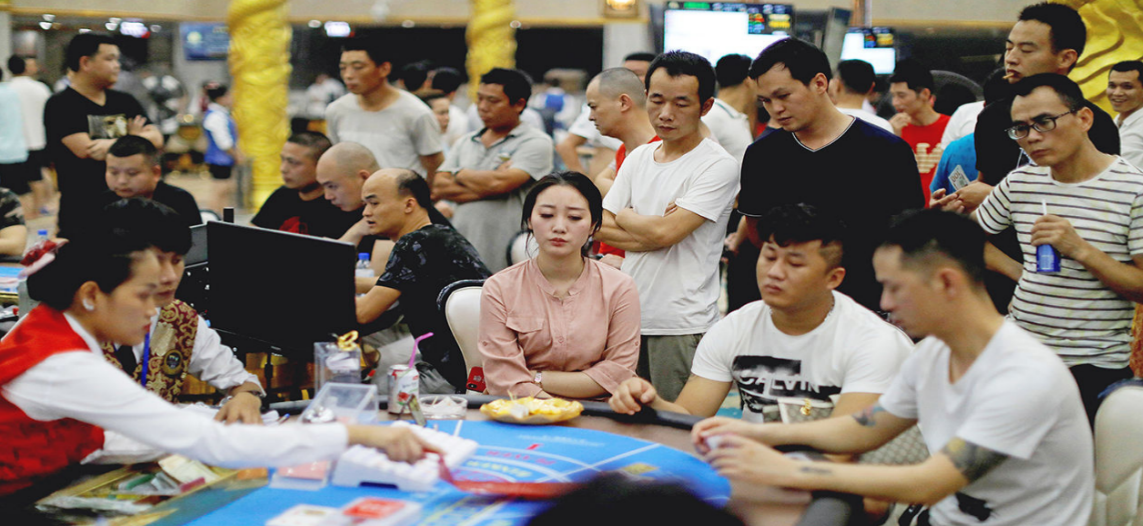Gambling is largely illegal in Hong Kong as a result of historical, social, and economic factors. The government has always taken a strict stance on illegal gambling due to concerns related to addiction, crime, and societal consequences.
Historical Context
Colonial-era regulations
During the time Hong Kong was under British rule, the colonial government established a series of regulations to control and manage gambling activities. Initially, the main concern was to maintain public order and reduce criminal activities associated with gambling. Over time, these regulations expanded, paving the way for the establishment of the Hong Kong Jockey Club, a government-sanctioned entity for horse racing and lottery services.

The evolution of gambling culture in the region
Gambling has deep roots in Chinese culture, from traditional games like Mahjong to betting on cricket fights. With Hong Kong’s unique position as a melting pot of Eastern and Western cultures, its gambling culture also witnessed a fusion of practices. Western-style casinos, influenced by those in Europe, became popular among the elite. Meanwhile, street-side gambling stalls, influenced by traditional Chinese practices, thrived among the masses. The region’s rapid economic growth also played a role, as increasing wealth led to higher stakes games and an influx of visitors interested in the thrill of gambling.
Influence of foreign gambling practices
Hong Kong’s status as an international trading hub brought a myriad of foreign influences, including gambling practices. British colonizers introduced horse racing, which soon became a major pastime in the territory. Additionally, Macau, a nearby Portuguese colony, heavily influenced Hong Kong’s gambling scene with its lavish casinos and varied games. Many Hong Kong residents would frequently travel to Macau to indulge in activities not permitted in their home territory. This cross-border gambling culture further shaped the policies and attitudes towards gambling in Hong Kong.
The Social Perspective
Impact of gambling on families and society
Gambling, while a source of entertainment for many, can have severe ramifications on families and society at large. High-stake losses can lead to financial instability for families, often resulting in stress, strained relationships, and, in some cases, broken homes. Children in families where a member has a gambling problem may face neglect, leading to longer-term psychological and emotional issues. Moreover, the society at large bears the cost too. Increased gambling can lead to a reduction in productivity, as individuals might skip work or underperform due to gambling-induced stress or fatigue. Public resources might also get diverted to tackle gambling-related issues instead of other pressing matters.
Societal concerns about addiction
Gambling addiction, often referred to as problem gambling, is a major concern in many societies, including Hong Kong. Individuals with a gambling addiction are unable to control their urge to gamble, even when they are aware of its negative consequences. This addiction can lead to severe financial losses, mental health problems, and a deterioration in personal relationships. Moreover, society pays a heavy price too. Increased crime rates, higher demand for mental health services, and a general decline in community well-being are often associated with areas having high rates of problem gambling.
The relationship between gambling and crime
There’s a pronounced link between gambling and crime. Areas with prevalent gambling activities tend to see spikes in crimes like theft, fraud, and even violence. This occurs as individuals try to recoup their losses or find funds to continue gambling. Additionally, illegal gambling dens become hotspots for other illicit activities, from the sale of contraband to organized crime. The lure of quick money also attracts vulnerable individuals to the world of gambling, making them susceptible to criminal influences. Furthermore, the mafia and organized crime groups often find a foothold in areas where illegal gambling thrives, leading to a spike in crime rates and a decline in overall public safety.
Economic Implications
The role of legal gambling avenues, like the Hong Kong Jockey Club
The Hong Kong Jockey Club stands as a testament to the economic potential of legalized gambling. Established as a horse racing institution, it has since become one of the most substantial taxpayers in Hong Kong and a prominent donor to charity. Its operations not only generate massive revenue but also create thousands of jobs across its betting branches, racecourses, and other affiliated sectors. While some criticize the Jockey Club for holding a monopoly on legal gambling, there’s no denying its significant contribution to Hong Kong’s economy.
The potential financial benefits and drawbacks of gambling
Gambling offers the promise of substantial financial inflows. Tourist destinations with casinos often witness increased visitor numbers, leading to higher revenues from both gambling and non-gambling sectors like hospitality, entertainment, and dining. On the other hand, the drawbacks are significant too. A surge in gambling activities can lead to social costs like addiction treatments, increased law enforcement requirements, and bankruptcy proceedings, which might outweigh the direct revenue benefits. Moreover, an over-reliance on gambling revenues can make the economy vulnerable to external shocks, such as shifts in tourist preferences or global economic downturns.
Impact on local businesses and employment
Gambling establishments, be it casinos or racetracks, can significantly impact local businesses. Restaurants, hotels, and entertainment venues near these establishments often witness a surge in customers. However, this boon can also turn into a bane. When residents spend more on gambling, they might cut down on other discretionary expenses, hurting businesses not associated with the gambling sector. Employment-wise, while gambling hubs do generate jobs, the nature of these jobs is essential to consider. Casino jobs, for instance, might not offer the same long-term stability or growth potential as other sectors, making the region’s workforce more vulnerable to industry-specific downturns.
The Hong Kong Jockey Club: A Special Exception
History and establishment of the Hong Kong Jockey Club
The Hong Kong Jockey Club (HKJC) originated in 1884. What began as a modest racing club for the colony’s elite soon became an integral part of Hong Kong’s cultural and social fabric. The first races took place in Happy Valley, and over time, as the city grew and modernized, so did the club’s influence and infrastructure. Today, with state-of-the-art facilities and immense popularity, the HKJC isn’t just a hub for horse racing enthusiasts but also a historical symbol of the city’s colonial past blending with its vibrant present.

Its legal status and how it differs from other forms of gambling
In a city where most forms of gambling face stringent restrictions, the HKJC enjoys a unique legal status. It holds a government-granted monopoly on horse racing, football betting, and lotteries in the region. This exclusivity stems from the club’s long-standing relationship with the city and the trust it has built over the years. While underground gambling dens or unregulated online platforms might offer similar betting opportunities, they operate outside the law, making them prone to criminal activities and offering no guarantees for their patrons. In contrast, the HKJC offers a regulated, transparent, and safe environment for those looking to indulge in their betting passions.
Economic contributions and charitable activities
Beyond its entertainment value, the HKJC plays a pivotal role in Hong Kong’s economy. It stands as one of the most significant taxpayers, ensuring that a portion of the city’s gambling passions directly contributes to public coffers. But the club’s economic footprint extends beyond taxes. Through its charitable arm, the Hong Kong Jockey Club Charities Trust, it has donated billions to various causes, ranging from education and health to arts and culture. This dual role of an entertainment hub and a philanthropic powerhouse makes the HKJC not just an exception in Hong Kong’s gambling landscape but also a model for how gambling institutions can contribute positively to society.
Regulatory and Legal Framework
The Gambling Ordinance of Hong Kong
The Gambling Ordinance serves as the cornerstone of Hong Kong’s stance on gambling. Instituted in 1977, this piece of legislation delineates what forms of gambling are legal and which ones aren’t. The Ordinance mainly permits gambling activities run by the Hong Kong Jockey Club, leaving most other forms in a gray area or illegal. Over the years, this regulation has been updated to stay relevant with the changing times, especially considering the advent of online gambling platforms and other technological advancements.
Enforcement and penalties for illegal gambling
Ensuring adherence to the Gambling Ordinance requires rigorous enforcement. Hong Kong’s law enforcement agencies are proactive in identifying and shutting down illegal gambling operations. Individuals found guilty of operating or even participating in such activities can face hefty fines and imprisonment. For instance, operating an illegal gambling establishment can lead to a fine and a jail term. Moreover, those found betting in such places aren’t spared either. This rigorous enforcement ensures that illegal gambling doesn’t gain a stronghold in the city, protecting citizens from the potential pitfalls of unregulated gambling activities.
Recent changes and amendments to the law
In response to the rapidly changing landscape of gambling worldwide, especially with the rise of digital platforms, Hong Kong’s regulatory framework has witnessed several updates. Efforts have been made to crack down on online gambling websites targeting Hong Kong residents, with service providers facing penalties if they violate the law. Moreover, the authorities have collaborated with international agencies to curb cross-border gambling activities, ensuring that the city’s residents aren’t lured into potentially harmful or fraudulent platforms. These continuous updates reflect the government’s intent to protect its citizens while balancing the rich heritage and economic potential of regulated gambling activities.

